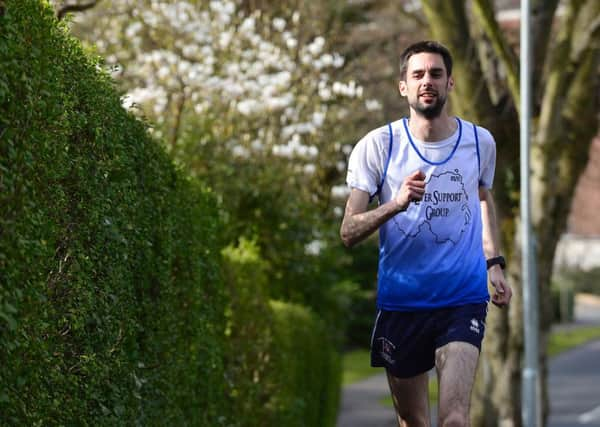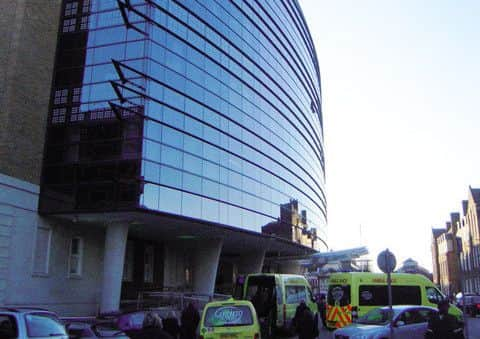Belfast man to run marathon in memory of the unknown woman who saved his life


There is nothing unusual about that.
He will also be running the 26.2 mile distance to mark someone’s birthday, which is more unusual.
But this marathon runner does not actually know the exact date on which the person on behalf of whom he is running the race was born.


Advertisement
Hide AdAdvertisement
Hide AdIn fact he knows almost nothing about the person except her gender, and that she is dead. And also that part of her is inside him.
Her liver.
Philip Cairnduff from Dundonald is aged 29 and he is not an alcoholic.
He barely drinks alcohol and never much did, and it is worth recording that fact because people can assume that liver transplant recipients have suffered organ damage due to alcohol.


Philip had a catastrophic liver failure, for reasons that are still not fully understood. He had just turned 18 and suddenly found himself on the brink of death.
Advertisement
Hide AdAdvertisement
Hide AdPhilip had just finished a two-week trip to Africa in August 2004 with a team of 12 parishioners of Stormont Presbyterian Church, including his father, Donald, a teacher. They were constructing low cost housing with Habitat for Humanity in Botswana.
“It was my first time in the third world,” he recalls. “It was a huge culture shock to see poverty first hand.”
On the last day he began to feel ill: “I remember it was a particularly hot morning and I wasn’t feeling 100%. I thought it was some sort of tummy bug or sun stroke. I lost my appetite and felt exhausted.”
The next day, as the long journey home began with an arduous eight hour bus journey, his condition worsened.
“I was feeling very sick.”
Advertisement
Hide AdAdvertisement
Hide AdNo-one in the team realised the gravity of his illness and it was thought best to get him back to the United Kingdom.
The air route home involved a short flight to Johannesburg, then a 10-hour flight to London and finally an onward flight to Belfast.
“To this day, I don’t know how I survived it,” Philip says.
By London, he could barely stand.
“People were starting to catch on that it was more than a stomach bug,” he recalls.
Somehow he made it to Belfast, drained and exhausted. He was lying in one of the rows of seats in the City Airport terminal, something you might see in a departing passenger and not an arriving one, when a woman came over and explained that she was a doctor.
Advertisement
Hide AdAdvertisement
Hide AdCould she do anything to help? Jaundice was starting to show on him. “You need to go straight to hospital,” she said.
His last memory is from the infectious diseases ward of the Royal Victoria Hospital (RVH), looking at his 18th birthday cards. He had reached the milestone on the Friday, en route to the UK. This was now the Saturday night.
On the basis of liver functioning tests, he was flown on the Monday night by air ambulance to King’s College Hospital, London with his dad. His mum Jennifer and sister Laura followed by scheduled plane.
It was becoming clear to the family that something disastrous was unfolding.
Advertisement
Hide AdAdvertisement
Hide AdPhilip, now oblivious to events, was placed in the Liver Intensive Therapy Unit (LITU). Tests ruled out a tropical disease.
On the Tuesday night he had been sedated after he began pulling out lines that connected him to the machines, despite being barely conscious.
“I was agitated, which is unlike me. I’m quite a tolerant person.”
Then on the Wednesday morning at 8am, the nightmare phone call was made to Jennifer, who was staying across the road (Donald was staying at a relative’s further out from the hospital). Philip’s liver had failed completely and he was going to die unless an organ could be found.
Advertisement
Hide AdAdvertisement
Hide AdThe hospital could keep him alive until tea time. The average waiting time for a liver transplant for an adult is 145 days.
Philip was now the top of the so-called ‘super-urgent list’. Medical teams were searching for an organ.
Hours later his parents met the surgeon Paolo Muiesan. A liver had been found and they would operate straight away.
The transplant procedure began at 2.30pm and ended at 1.30am on the Thursday.
Advertisement
Hide AdAdvertisement
Hide AdPhilip woke up on Thursday August 19. He thought he was still in the RVH. Donald explained to his son that he was in fact in London and outlined what had happened.
In the 12 years since, Philip has been ill “a few times” but not critically. He still has low energy levels on occasion but has worked full-time without problem (now for a bank).
The doctors have only been able to conclude that he might have contracted an unrecognised strain of hepatitis back in 2004.
Philip had been due to go into his final year at Royal Belfast Academical Institution. He held back a year as his body took a year to recover, but he did finish (“the school was fantastic” after his trauma) and went to university in England.
Advertisement
Hide AdAdvertisement
Hide Ad“I live a fairly normal life and do things that most other people can do. I feel extremely grateful for every day that I have with the knowledge that my life was almost cut short.”
This, he adds, is “thanks to the generosity of a complete stranger”.
It is her for whom Philip is running on Monday. His doctors believe he is the first liver transplant recipient to run the Belfast Marathon.
Philip was allowed to know only two things about the donor. That she was a woman and that she was aged 48.
Advertisement
Hide AdAdvertisement
Hide AdHe deduces that it is likely that she died in “tragic circumstances”.
“I wrote to the donor family in the months after the transplant. It was probably the hardest thing I have ever done – write a letter to a family that had a bereavement. How do you put that into words?”
He shows no trace of resentment over the fact that he never received a response.
“I don’t know how they dealt with their grief.”
Philip figures that if the donor was aged 48 when she died, then she would have been turning 60 some time around now, and so he is marking that anniversary in his run. He plans to write to the family again after the marathon, although when you know nothing about a person you cannot be sure the extent to which they have a family.
Advertisement
Hide AdAdvertisement
Hide AdPhilip, who ran cross country at school, has competed in the British transplant games since 2006 and last year took part in the world games in Argentina, wining silver in the 5km run (17 mins, 26 secs) and gold in the walk (also 5 km)
He has been training for the marathon since the start of the year.
“I feel a special connection to this woman, even though I never knew her. That is why I am doing the marathon, in her memory.
“In Argentina, the idea of honouring donors was something that became very real to me. She would be turning 60 at some time this year. It seemed appropriate to mark that occasion.”
Advertisement
Hide AdAdvertisement
Hide AdHe had also wanted to run a marathon before he turns 30, which he does in August.
Philip will be raising money for the RVH liver support group, which has supported him since his transplant.
He is nervous about the scale of a marathon, but also “very excited” and feels ready for it, after all the preparatory runs with his Lagan Valley Athletics Club.
Philip is still a member of a Presbyterian church, now Fitzroy near Queen’s.
Advertisement
Hide AdAdvertisement
Hide AdHe was raised a Christian but says became serious about it at the age of 12. Looking back on his drama, he says: “It was all so perfectly co-ordinated – Africa. The doctor at City Airport. London. The organ becoming available.”
He adds: “Getting through was a big result of my faith. The overwhelming support of other Christians in NI was fantastic. So many people prayed and came to visit.”
Reflecting on the woman who saved his life, he says: “The one thing I would like to think is that at some point in her life she made a conscious decision to go on the donor register.”
• Go to www.organdonation.nhs.uk to become an organ donor. The liver support group is at www.rvhliversupportgroup.org